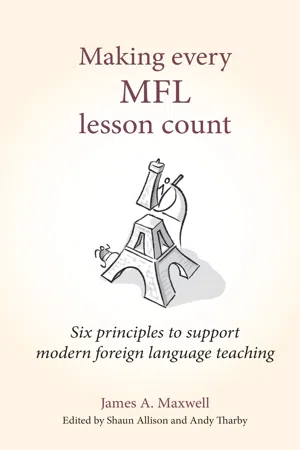The example of Mrs Pentland’s Year 7 class, as they transition to secondary school, highlights how it is not always an even playing field in our MFL classrooms. Some students will come with prior exposure to the language at primary school, either through formal curricular time or extracurricular opportunities such as a languages club. While these students often look forward to their secondary school language learning experience and are initially keen to demonstrate their prior knowledge, let’s bear in mind all the potential ‘Serenas’ who have not been exposed to languages at primary level, and who may already be forming a preconception that they are at a disadvantage or behind in their learning. Sometimes during our teaching careers we may also, of course, teach bilingual young people who have grown up in a household where the foreign language is a means of communication, either primarily or partly.
Alongside these varying levels of knowledge, there is the question of the cultural capital which our students have gained before transitioning to secondary school. Some will have visited the target language country, either once or twice or on a repeated basis. They will have gleaned cultural experiences which will, in turn, have fashioned their perceptions of the country’s culture and language in a mostly positive manner. They will have formed an array of anecdotes which will act as a point of reference as they study the language further. This melange of prior experience, cultural capital and varying degrees of knowledge can make the provision of challenge for students in the MFL classroom a complex affair. Large class sizes and having to teach MFL within the constraints of a rigid school timetable can add to that complexity.
Challenge as a concept is slightly different from the other five principles in this book. While there are certainly specific teaching strategies that can be employed to ensure that challenge is appropriate for all students at a given time, the concept itself is much more to do with our long-term teaching approaches and therefore should overarch everything. It should run through everything we do – the culture we establish, the teaching strategies we utilise, the routines we embed, the academic register we develop in the classroom (particularly the features of vocabulary and grammar) and the language we use in order to communicate expectations to our students. A little like the fruits, nuts and spices which permeate an exceedingly good German stollen, appropriate challenge gives our lessons their core essence, texture and flavour, and is simply crucial in order to ensure successful outcomes.
Challenge in the modern languages classroom can be defined as the provision of work which causes students to think deeply and engage in healthy ‘struggle’. Struggle is healthy when it challenges students in a manner which allows them, over time, to learn effectively. In the specific case of modern foreign languages, appropriately pitched challenge will afford our students opportunities to develop the procedural knowledge of grammar, vocabulary and discourse rules of the language. Ultimately, such challenge will allow them to develop automaticity – being able to draw on long-term memory in order to use and manipulate the language quickly and fluently.
When faced with a difficult class or a class with motivational issues (perhaps on a Friday afternoon!), it may seem like the simpler option to opt for ‘quick win’ strategies in which students experience some superficial success without struggle. However, this may come at the expense of high challenge and deep thinking, as it often happens within students’ comfort zones. An example of this could be spending entire lessons focusing on the acquisition of single-word vocabulary. While this is important as a building block for a student’s cumulative linguistic development, our aim should be to provide students with structured opportunities to use vocabulary in context as quickly as possible.
As we will explore further in Chapter 2, vocabulary needs to be owned, used, assimilated and practised deliberately within structures very soon after it is first encountered. The Teaching Schools Council’s Modern Foreign Languages Pedagogy Review reflects this:
Putting language into context as soon as possible, strong modelling strategies, effective questioning, high-quality opportunities for students to practise and robust feedback will all help to develop procedural knowledge and automaticity of skill in long-term memory, thus facilitating success and boosting motivation.
The need for our students to experience success in the MFL classroom is cr...

